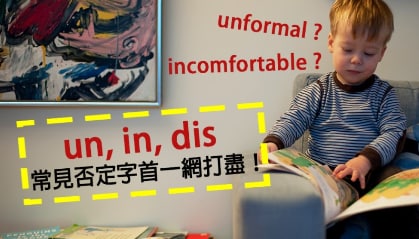un-
常見的動詞前否定:
unlock (v.) 打開、解開(常常會和 lock 搞混意思,lock 是上鎖,unlock 則是有打開之意)
undress (v.) 脫下
uncover (v.) 揭開、揭露
Mom kept worrying if she had left the door unlocked on our way home.
媽媽在回家的路上一直擔心門沒有鎖。
She slipped into bed as soon as soon as she undressed herself.
她一脫下衣服,就爬上床睡。
She uncovered her secrets after she got drunk last night.
昨晚喝醉之後,她向我們坦露她的秘密。
常見的形容詞前否定:
uncomfortable (adj.) 不舒服的、難受的、不自在的
unreal (adj.) 不真實的、虛幻的、奇異的
uncommon (adj.) 罕見的、不常有的
When he entered the living room, his wife sat still, with an uncomfortable silence.
當他走進客廳,他的妻子靜靜地坐著,伴隨著令人不自在的沉默。
What happened to Harry was so unreal that Ron cannot completely believe it!
發生在哈利身上的事太不真實了,榮恩根本不相信!
It is uncommon for such a strong man to get this kind of disease.
如此強壯的男人卻得了這種疾病,真是罕見。

in-
由 in 衍生出的相關否定字首還有 im、il、ir 等,而要選擇用哪一個字首則視後面單字的開頭字母而定。
常見的 in 否定:
informal (adj.) 非正式的、非正規的、隨意的 (常會誤用成 unformal!要特別小心!)
incorrect (adj.) 不正確的、不適當的
invisible (adj.) 看不見的、無形的
The school authorities claimed that they would not accept any informal pleas from students.
校方表示將不會接受學生的任何非正式申訴。
It turned out that the statistics might be incorrect.
結果顯示統計數字可能有誤。
This magic cloak can make people invisible.
這件魔法斗篷能讓人隱形。
什麼時候使用 im 字首表達否定?
當後面接的單字為 b, m, p 開頭時,就要使用字首 im:
imbalance (n.) 不平衡、失調
immortal (adj.) 不朽的、永生的、永存的
improper (adj.) 不正當的、不合適的
The global wealth imbalance reflects that the distribution of resources is extremely unequal.
當今全球的財富失衡反應嚴重的資源分配不對等。
Some people believe that the spirit is immortal.
有些人相信靈魂不滅。
Eating and chatting loudly in class are considered improper behaviors.
課堂中吃東西或大聲聊天是相當不恰當的行為。
什麼時候使用 il 字首表達否定?
後面接的單字為 l 開頭時,要表達否定則在字首加 il:
illegal (adj.) 非法的、違法的
illiterate (adj.) 文盲的、不識字的
illogical (adj.) 不合邏輯的、不明智的、無理由的
It’s illegal to carry guns in our country.
在我們國家,攜帶槍枝是違法的。
The educational organization has long been dedicated to lowering the amount of illiterate people in this country.
這個教育組織致力於降低該國家的文盲人口數量。
I lost faith in this candidate for his statements were quite illogical and unconvincing.
這位候選人的言論完全沒有邏輯也毫無說服力,我已經對他失去信心了。
什麼時候使用 ir 字首表達否定?
後面接的單字為 r 開頭時,要表達否定則在字首加 ir:
irregular (adj.) 不規則的、不合常規的 (常會誤用為 unregular ! 要特別注意!)
irrelevant (adj.) 不相關的
irrecoverable (adj.) 無法挽回的
The test is to examine the students’ understanding on irregular verbs.
這項考試是為了檢測學生對不規則動詞的理解。
The whole debate seemed to be irrelevant to the present issue.
整場辯論似乎變得和目前的議題毫不相干。
The policy has caused irrecoverable environmental damage since it was carried out last year.
自從去年這項政策實施後,環境的破壞儼然到了無法挽回的局面。
*補充*
有些單字雖然是 b, m, p 開頭,但卻不用加 i 再重複字首,如下:
unpopular、unlawful、unmatched…由這些可以看出, un 開頭的否定不管後面字詞的開頭為何皆不須變化!不要和 in 的否定用法搞混了唷!
dis-
disagree (v.) 不同意、反對
disrespectful (adj.) 不尊重的、無禮的
disloyal (adj.) 不忠誠的
Jenny’s parents strongly disagree with her decision of going abroad alone.
珍妮的父母強烈反對她獨自出國的決定。
It may be kind of disrespectful to refuse his sincere invitation.
拒絕他真誠的邀約可能有點無禮。
Some fans thought this player was disloyal to his team while some took this as a common phenomenon in NBA.
有些粉絲認為這位球員對球隊不忠誠,但有些人認為這在 NBA 中是家常便飯的現象。
特別注意:有些單字一旦詞性轉換,否定字首就會跟著改變!
這部分有時會出現在考題中,可能是考詞性也可能是考字義,要小心哦!
同樣表達否定,但詞性不同,字首就不同:
unfortunate (adj.) 不幸運的、倒楣的、遺憾的 → misfortune (n.)
The unfortunate kid was sent to a remote orphanage afterwards.
那個不幸的孩子後來被送去偏僻的孤兒院了。
*延伸*
要表達「不幸」、「倒楣」之意的名詞時,不能用 unfortune(沒有這個字哦!)
misfortune 才是名詞,但特別的是也沒有 misfortunate 這種字來當形容詞哦!
反而 misfortuned 和 unfortunate 是同義字。
unequal (adj.) 不相等的、不平等的 → inequality (n.)
常見的詞彙搭配有:
unequal treatment 不平等待遇、unequal size 不相等大小、unequal exchange 不等值交換
income inequality 收入不平衡、gender inequality 性別不平等、economic inequality 經濟不平等
unjust (adj.) 不公平的、不公正的 → injustice (n.)
unjust enrichment 不當得利、unjust decision 不公正的決定、unjust laws 不公正的法律
Justice will prevail over injustice.
正義將戰勝非正義。
unable (adj.) 不能的、不會的→ inability (n.)
be unable to 不能/不會/無法做某事
be unable to put words together 一句話都說不清楚
*補充*: inability 和 disability 的不同
disability 還可以指身體上的殘疾,因此表達殘障人士時會使用 the disabled







